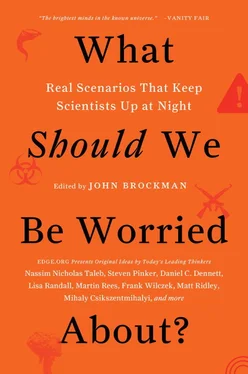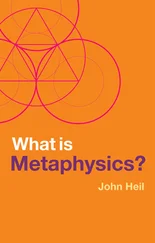Data, as we know, is power—and as our personal metrics become ever easier to amass and store, that power needs rebalancing strongly toward us as individuals and citizens. We impeded medical progress by letting pharmaceutical companies selectively, and on occasion misleadingly, control the release of clinical trials data. In the emerging yottabyte age, let’s ensure the sovereignty of the people over the databases by holding to account those with the keys to the machine.
BIG EXPERIMENTS WON’T HAPPEN
LISA RANDALL
Theoretical physicist & cosmologist; Frank B. Baird, Jr., Professor of Science, Harvard University; author, Knocking on Heaven’s Door: How Physics and Scientific Thinking Illuminate the Universe and the Modern World
I worry that people will gradually stop the major long-term investments in research that are essential if we are to answer difficult (and often abstract) scientific questions. Important fundamental experimental science will always be at the edge of what is technologically feasible, and moving forward requires commitment to advances. The applications are not obvious, so there has to be an underlying belief that finding the answers to deep and significant questions about how the universe evolved, how we evolved, what we are made of, what space is made of, and how things work is important. The ability to find answers to these questions is one of the characteristics that makes human beings unique and gives meaning to our lives. Relinquishing this for short-term ends would be a tragedy.
In my field of particle physics, everyone is worried. I don’t say that lightly. Recently I’ve been to three conferences where the future was a major topic of discussion. Many ideas were presented, but my colleagues and I certainly worry whether experiments will happen.
At the moment, we have the Large Hadron Collider—the giant accelerator near Geneva, where protons collide at very high energies—to turn to for new experimental results. In the summer of 2012, we learned that a Higgs boson exists. It was a major milestone, of which the LHC engineers and experimenters can be proud. With last year’s data, where the decays of many more Higgs bosons were recorded, we will understand more about the particle’s properties.
But we also want to know what lies beyond the Higgs particle—what is it that explains how the Higgs boson ended up with the mass it has. The LHC also promises to answer this question when it’s turned back on in 2015 after having been shut down for two years to upgrade to higher energy.
But the energy gain will be less than a factor of 2. I can fairly confidently say that I expect answers implying the existence of new particles beyond the Higgs boson. But I can’t confidently say that I expect them to be less than a factor of 2 heavier than the energies we have already explored. This is worrisome. Not finding anything, ironically, would be the best argument that the LHC energy was simply not high enough and more energy is necessary. But discoveries are what usually egg us on. Not finding anything would be very bad indeed.
The Superconducting Super Collider, which was canceled by the U.S. Congress, would have had about three times the energy. It was designed with the ultimate physics goals in mind, which argued for a more powerful machine. The LHC—though designed to answer similar questions—was built in a pre-existing tunnel, which constrained the maximum energy that could be achieved. If we had three times the energy, I’d be a lot less worried. But we don’t.
So I’m worried. I’m worried I won’t know the answer to questions I care deeply about. Theoretical research (what I do) can of course be done more cheaply. A pencil and paper, and even a computer, are pretty cheap. But without experiments or the hope of experiments, theoretical science can’t truly advance. Happily, advances wouldn’t cease altogether, as we would still get new results from astronomical observations and smaller-scale experiments on Earth. And there would be many ideas to play around with. But we wouldn’t know which of them represented what is really going on in the world.
On top of that, the universe often has more imagination than we do. We need to know what the universe is telling us. Some of the best new ideas come from trying to explain mysterious phenomena. I hope the future presents us with some answers—but also more mysteries to explain.
THE NIGHTMARE SCENARIO FOR FUNDAMENTAL PHYSICS
PETER WOIT
Mathematical physicist, Columbia University; author, Not Even Wrong: The Failure of String Theory and the Search for Unity in Physical Law
During the 20th century, the search for a theory of how the physical world works at its most fundamental level went from one success to another. The earliest years of the century saw revolutionary new ideas, including Einstein’s special relativity and the beginnings of quantum theory, while the decades that followed each of these ideas were times of surprising new insights. By the mid-1970s, all the elements of what is now called the Standard Model were in place, and the century’s final decades were dominated by endless experimental results confirming this theory’s predictions. By the end of the millennium, we were left in an uncomfortable state: The Standard Model was not fully satisfactory, leaving various important questions unanswered but no experimental results disagreeing with it. Physicists had few hints as to how to proceed.
The Large Hadron Collider was supposed to be the answer to this problem. It could produce Higgs particles, allowing study of a crucial and less than satisfactory part of the Standard Model which had never been tested. A raft of heavily promoted speculative and unconvincing schemes for “Beyond Standard Model” physics all promised exciting new phenomena to be found at LHC-accessible energies.
Results from the LHC have started to come in, and they are carrying disturbing implications. Unsurprisingly, none of the promised “Beyond Standard Model” particles have put in an appearance. More worrisome, though, is the big LHC success: the discovery of the Higgs. Within the still-large experimental uncertainties, now that we’ve finally seen Higgs particles they look all too much as if they’re behaving just as the Standard Model predicted they would. What physicists face now is a possibility they always knew was there but couldn’t believe would really come to pass: the “Nightmare Scenario” of the LHC finding a Standard Model Higgs and nothing more.
For the experimentalists, this leaves the way forward unclear. The case for the LHC was obvious: The technology was available, and the Higgs or something else had to be there for it to discover. Going to higher energies is extremely difficult, however, and there’s now no good reason to expect to find anything especially new. A lower-energy “Higgs Factory” special-purpose machine designed for detailed study of the Higgs may be the best bet. In the longer term, we may need technological breakthroughs to allow studies of physics at higher energies at affordable cost.
Theorists in principle are immune to the constraints imposed by technology, but they face the challenge of dealing with the unprecedented collapse of decades of speculative work and no help from the experiment on the question of where to turn to for new ideas. The sociological structure of the field is ill equipped to handle this situation. Already we have seen a turn away from confronting difficult problems and toward promoting fatalistic arguments that nothing can be done. Arguments are being made that because of random fluctuations we live in a corner of a “multiverse” of possibilities, with no hope of ever answering some basic questions about why things are the way they are.
Читать дальше












